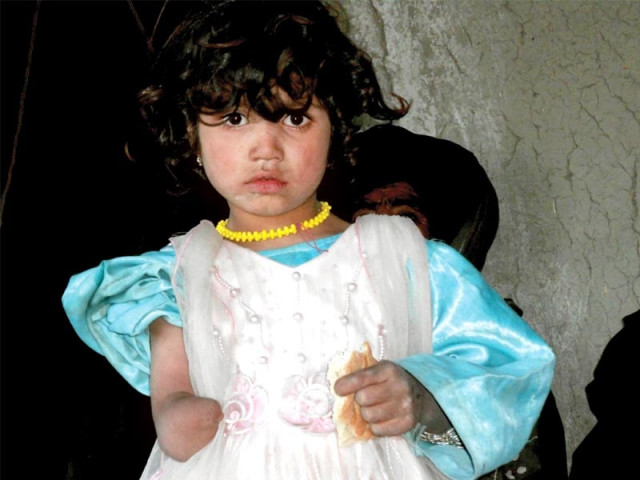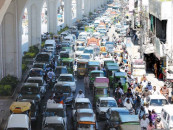Dreaming of peace: 30 years of graves and nightmares
As another generation bears the brunt of war, Afghans hope for peace.

On the outskirts of the city, 800 and more families from war-infested Helmand and Sangeen provinces live in a refugee camp where everyone knows Zarmina.
She is a special child, a survivor of an air raid four years ago, when bombing by US planes crippled her when she was 18 months old.
“It was a miracle that she lived,” recalls Mira Jan, her father. But the girl had to lose her right arm. That evening, Jan said, many people died. One family he particularly remembered was that of five-year-old Afsheen’s – his immediate neighbours. Their mud-house was hit by a bomb. “Only the girl (Afsheen) survived as she was not home,” said Jan.
She returned from a friend’s house to see the mutilated corpses of her father, mother and six siblings.
For three months after that raid, Jan’s family could not leave their village in Helmand due to heavy fighting. During this time, Zarmina got no medicine but a dose of opium every time she moaned of pain.
Jan said his daughter’s right arm, just below her elbow, was amputated by doctors to save her life after they finally made it to Kabul’s refugee camp.
What happened to Afsheen? No one had a clue. “In that panic, we lost her,” recalled Jan. A village elder claimed she was taken by her maternal grandfather to some other province.
Battling to survive the vicissitudes of a lingering war, Zarmina and Afsheen’s generation, just like their predecessors, faces an uncertain future.
Hafizullah Safi (60), a native of Kapesa province, lived through the three decades of unrest and war in his country. In the 1979-89 Afghan war, Safi lost his uncle and a brother who died fighting the Soviets. Towards the end of the war, Safi and his family moved to Kabul and never left it again.
During the civil war, he lost three cousins. They were forcibly recruited into a militia by a warlord while Safi ran to save his life. He remained in hiding till the Taliban took over Kabul in 1996. Under the Taliban’s reign, Safi said, people had security yet they were terrified. “Taliban were too strict. People were forced to live a miserable life in the name of religion,” he said.
Today, Safi with his 26 grand-children from 12 children lives in a more affluent Kabul. He works as a supervisor at a flourishing local market. And he wants this prosperity to continue and to extend to other parts of his country. People have now realised that even Taliban were not their true saviours, said Safi.
“We would fight anyone including Taliban who would try to enter our lands as enemy. But as friends, they will be greeted as brothers,” replied Safi to a question if people fear the Taliban would return on the exit of the US from Afghanistan.
Like another native of Helmand, Khawaja Muhammad (40), at Kabul’s refugee camp, Safi blamed ‘enemies’ of Afghanistan for imposing war that destroyed generations in his country. Both men said they know who was creating trouble in their lands.
“I like the people of Pakistan and Iran but not their governments,” said Safi. Muhammad said the governments in two neighbouring countries did not want peace in Afghanistan. “Instability here benefits them economically,” Safi explained.
Muhammad, however, was not happy with President Hamid Karzai. He said Karzai had abandoned them. “Twenty children and one woman died of cold last year at the camp and he (Karzai) was responsible,” said Muhammad.
He said that, despite his people’s multiple sacrifices, Karzai wanted them to leave the sanctuary of Kabul. They could not go back to Helmand to face bombs and bullets, he said.
“Why does he (Karzai) not kick the foreigners (US and Nato) out instead? He only needs to ask us once and we will push them out with our lives,” said Muhammad.
Though ready to fight any invading force even in future, the two Pushtun elders said their country had seen enough war and destruction. They now wanted to live in peace.
If for nothing else, to avoid another generation of Zarminas and Afsheens.
Published in The Express Tribune, May 27th, 2012.



















COMMENTS
Comments are moderated and generally will be posted if they are on-topic and not abusive.
For more information, please see our Comments FAQ